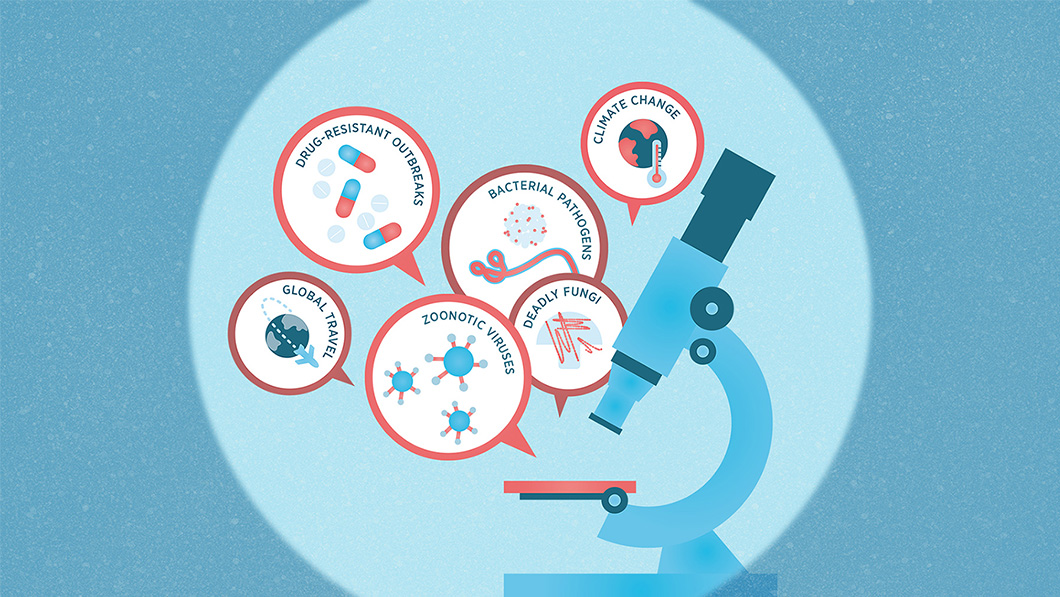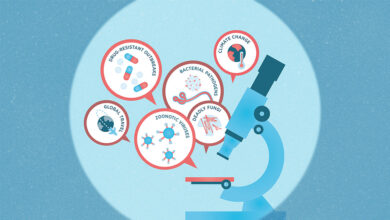
PPF Health Security: AI bioweapons and overdose spikes
Sponsored by:

PPF’s report The Next One: Preparing Canada for Another Health Emergency outlines the lessons learned from the pandemic and how Canada can safeguard against future health emergencies. To keep the discussion going — and to keep Canadians informed – this newsletter looks at what’s happening in the world of health security each week.
Here’s what we’re following:
Wait times and public pleas
Among the goals set out by the federal government and Ontario in a new $3.1 billion funding agreement are reduced wait times and “faster care for Canadians.” (The governments are also hoping to increase access to family doctors and hire more health-care workers.) The funding comes about a month after the Canadian Medical Association warned that a lack of primary care options is leading to overflowing emergency rooms across the country, and also follows PPF’s report on the matter, called Primary Care for Everyone: An urgent to-do list for reform.
Indeed, earlier this month, an emergency physician in Toronto told the Toronto Star that a “lack of space and waiting has resulted in patients under my care lying down on the [emergency department] floor,” and “wait(ing) eight hours for an EKG, five hours for basic blood work, four hours for children’s Tylenol, 40 hours waiting in a chair waiting for tests or consultations with a specialist.” Conditions are overwhelming — and similar stories have played out across the country for months.
In December, the Quebec government said people with only minor illnesses should stay away from the ER, and that the majority of patients who go to hospital ERs don’t need that level of care. In January, some hospitals in Ontario posted similar public pleas. As some pointed out at the time, this is bad policy — and does little to nothing to address the deeper issues behind overcrowding.
It also might be a red herring. According to data the Star compiled last week from 19 emergency departments across 10 health networks in the Greater Toronto Area and Ottawa, it is “clear that the vast majority of people in those crowded emergency rooms need to be there.”
Can $3.1 billion solve the problem? The Ontario government thinks so. “With more family doctors, as well as nurse practitioners, nurses, pharmacists, and social workers, health teams will ensure families can access timely, quality primary care,” the Ontario government said in its release. “This will also help reduce backlogs for surgeries and wait times in emergency rooms.”
Listen to our new podcast WONK with host Edward Greenspon. On Episode #8, Dr. Vivek Goel explains the urgent need to transform Canada’s badly outdated health data systems.
Are bioweapons easier to make with AI?
OpenAI thinks the answer is… maybe. In a research paper the company posted last week, OpenAI said that its generative artificial intelligence program GPT-4 “provides at most a mild uplift in biological threat creation accuracy.”
More specifically, OpenAI’s researchers concluded: “that access to (research-only) GPT-4 may increase experts’ ability to access information about biological threats, particularly for accuracy and completeness of tasks.” But OpenAI also admitted that “we are uncertain about the meaningfulness of the increases we observed,” and that the results “indicate a clear and urgent need for more work in this domain.” It’s possible, the report noted, “that future systems could provide sizable benefits to malicious actors.”
NYU professor and AI tech guru Gary Marcus disputed OpenAI’s conclusions (and its reading of its own data), writing in his Substack that “there is plenty of reason to be concerned.” By Marcus’s reading of the data, non-experts would not benefit from GPT-4. But, he writes, “experts really do seem to be helped, in every aspect of development.”
Marcus points out that the OpenAI data suggest that “experts were four times more likely to succeed on the pathogen formulation task with [large language models] LLMs than with internet (e.g., search) alone.” He goes on: “If even one malicious expert gets over the hump and creates a deadly pathogen; that’s huge… Unfortunately, in the specific domain in which we are talking about, bioweapons risk, even a tiny effect could literally be world-changing, in a deeply negative way.”
As it happens, RAND also recently launched a similar experiment to OpenAI’s and published its findings in January. It, too, gave experts access to an LLM and others only access to the internet. RAND’s research team’s findings “indicate that using the existing generation of LLMs did not measurably change the operational risk” of a biological attack. But even OpenAI might agree that “existing” is the key word.
RNA cancer therapy
New mRNA-based cancer immunotherapy has been administered to patients in the UK for the first time as of this past week. The trial, called Mobilize, aims to discover whether the therapy is safe, effective and tolerated by patients with lung or skin cancers.
While this is a first in the UK, mRNA therapies are already being tested elsewhere, with promising initial results. In May, a test of mRNA therapy on 16 patients at the Memorial Sloan Kettering (MSK) Cancer Center showed that patients tolerated the vaccines well. A follow-up trial launched in October set out to test mRNA’s effectiveness on approximately 260 MSK patients with pancreatic cancer.
And in December, mRNA vaccine manufacturers released results of a trial of the vaccine’s effectiveness alongside immunotherapy for some melanoma patients at high risk of getting cancer again. The study found that the combo therapy reduced the chances of recurrence or death by 49 percent with 62 percent lower risk of distant tumour cell spread, versus patients who’d only received the immunotherapy.
Overdose spike
In November, Health Canada called the illegal drug and overdose crisis “the most serious and deadly public health crises in our country’s history.” Since the pandemic, the problem has only worsened.
Belleville, Ont., declared a state of emergency last week after a surge in overdoses sent 23 people to the hospital over 48 hours. “The past two days have exemplified just how critical the addiction, mental health and homelessness crisis has become in our community,” said Mayor Neil Ellis.
In Prince Edward Island, public health officials reported seven fentanyl overdoses in a 24-hour period. It was the highest rate ever reported in the province.
While no deaths were reported in the PEI or Belleville cases, since 2016 more than 38,500 deaths in Canada have been attributed to opioids.
Volt Typhoon warning
Last week, U.S. federal security agencies warned that state-sponsored Chinese cyber actors have been targeting critical American infrastructure, pre-positioning themselves to potentially launch cyberattacks on critical infrastructure. The Cybersecurity and Infrastructure Security Agency (CISA), the National Security Agency (NSA) and the FBI — alongside other international cybersecurity agencies, including the Canadian Security Establishment (CSE) — pointed the finger at Volt Typhoon, a cyber group that the agencies say “has compromised the IT environments of multiple critical infrastructure organizations” in the communications, energy, transport, and water and wastewater sectors — the latter of which the agencies note in an accompanying document, are critical in maintaining public health and for health care.
When it comes to Canada, the direct threat to critical infrastructure is “likely lower” than that to the U.S., the agencies noted. All the same, if American infrastructure gets disrupted, “Canada would likely be affected as well, due to cross-border integration.”
Canadian hospitals are already familiar with direct cyber attacks, including a major attack on multiple hospitals last fall in southern Ontario. Earlier this month, Windsor Regional Hospital CEO David Musyj said that it will take the hospital most of 2024 to fully recover from the attack. The hospital was only just able to rescind its ‘code grey’ status — which meant that it had no access to digital health records — last Tuesday. Meanwhile, the hospital is still working to notify the more than 270,000 patients and staff whose sensitive information was compromised during the breach.
Events:
February
-
Feb. 14: March of the Biosimilars – STAT News. Virtual
-
Feb. 15-16: 9th World Conference on Applied Microbiology and Beneficial Microbes. Rome, Italy
-
Feb. 21: Wall Street Journal Health Forum. Boston, Mass.
-
Feb. 22: Future of Health Leadership, Informatics and Policy Conference. Toronto, Ont.
-
Feb. 22-23: GENAP Summit 2024. Geneva, Switzerland
-
Feb. 25-28: ViVe 2024. Los Angeles, Calif.
March
-
March 3-5: ACDM24. Copenhagen, Denmark
-
March 8-12: SXSW Health and MedTech Track 2024. Austin, Texas
-
March 11-15: 2024 HIMSS Global Health Conference. Orlando, Fla.
-
March 19-21: Rare Diseases Summit. Philadelphia, Pa.
-
March 26-28: Precision Med TRI-CON. San Diego, Calif.
Did someone forward you this newsletter? Subscribe to PPF: Health Security newsletter
This newsletter is produced by journalists at PPF Media and it maintains complete editorial independence.



